Author: Nicholas Houska, DO - University of Colorado, Children’s Hospital Colorado
A five-month-old boy has just undergone repair of a perimembranous ventricular septal defect utilizing cardiopulmonary bypass. Shortly after aortic cross clamp removal, the ECG exhibits ST segment elevation in leads II, III, and AVF. Administration of which of the following drugs is the MOST appropriate treatment?
EXPLANATION
Congenital cardiac surgery often poses the risk for air to enter the left sided cardiac structures, which can subsequently be embolized to the systemic circulation. Due to its anterior location, the right coronary artery is a common anatomical site for air to travel after release of the aortic cross clamp. This typically presents as ST segment elevation on the ECG and a variable degree of right ventricular dysfunction or arrythmias. Given the spectrum of congenital cardiac lesions, air embolism to the left coronary artery should also be considered in situations where it is anatomically located in a non-dependent area, and if clinical signs are suggestive. Management of coronary air embolism involves increasing the coronary perfusion pressure by increasing the aortic diastolic blood pressure. This often requires co-management between the anesthesiologist, surgeon, and perfusionist to decide the best method to increase diastolic blood pressure. Often a combination of increasing cardiopulmonary bypass flow and administration of vasoactive medications is usually successful. Myocardial dysfunction and ECG changes are typically transient, though this may be a cause of difficulty in separating from cardiopulmonary bypass due to arrythmia or ventricular dysfunction.
The correct answer in the scenario is A, administration of phenylephrine to increase the coronary perfusion pressure. Other treatments include increasing the cardiopulmonary bypass pump flow or administration of other vasoactive agents, such as norepinephrine, epinephrine or vasopressin. These treatment options typically provide sufficient pressure to force the air bubbles through the coronary circulation. Administration of nitroglycerin is unlikely to be of benefit as the problem is related to a mechanical obstruction with air rather than coronary vasospasm. Esmolol is not the best option in this clinical scenario, though prevention of tachycardia is helpful to decrease myocardial oxygen demand.
REFERENCES
Monaco F, Di Prima AL, Kim JH et al. Management of Challenging Cardiopulmonary Bypass Separation. J Cardiothorac Vasc Anesth. 2020;34(6):1622-1635. doi: 10.1053/j.jvca.2020.02.038.
Sarkar M, Prabhu V. Basics of cardiopulmonary bypass. Indian J Anaesth. 2017;61(9):760-767. doi: 10.4103/ija.IJA_379_17.
